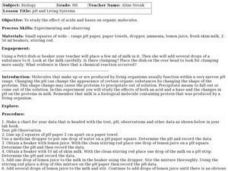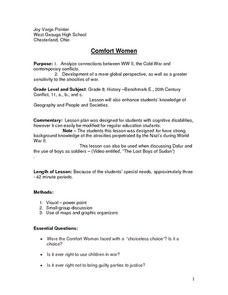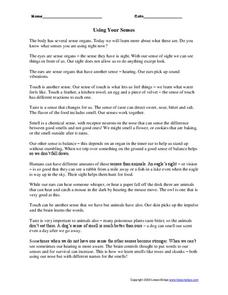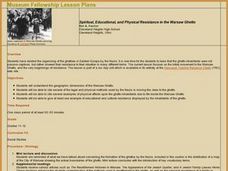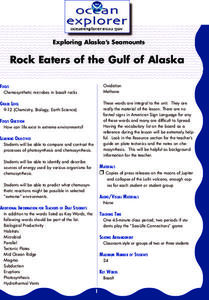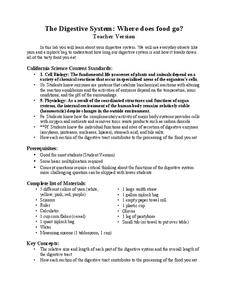Olomana School
Mixtures and Solutions: Paper Chromatography Experiment
Why does some ink bleed through paper, and other ink doesn't? Practice some paper chromatography to separate the colors from a pen with an interactive experiment for middle and high schoolers. Learners use a variety of solutions to track...
University of North Carolina
Music
Music is a universal pleasure, but writing about it can be a little trickier. An informative handout discusses common types of music writing assignments that one might encounter in a college-level course. Individuals read about musical...
Cornell University
Glued into Science—Classifying Polymers
Explore the unique characteristics of polymers. A complete lesson begins with a presentation introducing polymers. Following the presentation, young scientists develop a laboratory plan for creating substances using polymers. They...
Maryland Department of Education
The Concept of Diversity in World Literature Lesson 9: Debating Imperialism
To gain an understanding of Imperialism, class members read Rudyard Kipling's poem, "The White Man's Burden" and Mark Twain's essay, "To the Person Sitting in Darkness." Groups compare these perceptions of non-white cultures with the...
Virginia Department of Education
Acid-Base Theory
Litmus paper, why so blue? A chemistry instructional activity includes a pre-lab activity, practice calculating pH, an experiment measuring the pH in acids and bases, a titration demonstration, and a titration experiment.
National Nanotechnology Infrastructure Network
Synthesis and Characterization of CdSe Quantum Dots
Does the size of a sample change the physical properties of that substance? It turns out it can! Young scientists combine physics and chemistry to synthesize CdSe quantum dots and record their color properties. Learners should...
Curated OER
Effects of pH on Organic Molecules
Students investigate the effects of an acid and a base on the structure of milk protein. They observe the changes to droplets of milk when adding ammonia and lemon juice and relate the changes to old, curdled milk. An extension using...
Curated OER
Effects of Acid Rain
Third graders explore the concept of acid rain and its effects on ecosystems. They are placed in groups and using a graphic organizer they brainstorm their ideas about what would happen to the ecosystems living within these environments...
Curated OER
Plant Structure, Function and Growth
Students study three structures of a plant as well as their locations and functions. In this botany lesson students complete several activities on plant organs and their functions.
Curated OER
This Life Stinks
Students study how organisms that live in cold seep communities get energy from methane. In this organism lesson students write a brief report and identify oxidation reduction reactions and explain if these are dependent of...
Curated OER
Comfort Women
Ninth graders analyze connections between WW II, the Cold War and contemporary conflicts. They discover a more global perspective, as well as a greater sensitivity to the atrocities of war, and how the atrocities against the...
Curated OER
Using Your Senses
In this using your senses worksheet, students read a 1 page article on senses and then connect 6 body parts to their actual senses by drawing a line from one to the other.
Curated OER
Spiritual, Educational, and Physical Resistance in the Warsaw Ghetto
Students review the organization of the ghettos in Eastern Europe. Using the internet, they gather more insight on the people who lived in the ghettos. They discuss the reaction of some members to join resistance movements. They also...
Curated OER
Hardy Heart: Kit Instructions
Students describe human anatomy by reading a children's book. In this heart health lesson, students examine illustrations of heart images and several organ related children's stories. Students discuss ways to keep a healthy heart and...
Curated OER
Rock Eaters of the Gulf of Alaska
Students compare and contrast the processes of photosynthesis and chemosynthesis. They identify and describe sources of energy used by various organisms for chemosynthesis.
Curated OER
East Asia--The Asian Holocaust
Ninth graders study the effects of the Asian Holocaust by comparing it to the Nazi Holocaust. They view a Power Point and discuss the comparisons between both Holocausts. As they compare and contrast both, they discuss their reactions...
Curated OER
Investigating the Response of Worms to Soil Improvers
The worms crawl in, the worms crawl out, but do they care what soil is all about? Find out in an easy and fun controlled experiment. Have your young biologists hypothesize, test, and draw conclusions about which type of soil worms...
Curated OER
Classification of Animals
Third graders practice classiyfying items and identify three major characteristics scientists use to classify animals. They describe the differences between ectothermic and endothermic animals.
Curated OER
WS 10.9 Plastic Recycling
In this recycling worksheet, students search for as many types of plastics categorized with the resin identification codes and fill in a chart for each plastic type. They identify the product name, the category the plastic is in, the...
Curated OER
WS 12.9 Aromatic Compounds
In this aromatic compounds worksheet, students write the IUPAC names for given aromatic compounds and they draw line formulas for molecules.
Curated OER
The Campaign of 1840: William Henry Harrison and Tyler, Too
High schoolers list some issues important during the campaign of 1840. They compare and contrast the careers of Martin Van Buren and William Henry Harrison before they became president and explain why the Whigs wanted to find a candidate...
Texas State Energy Conservation Office
Investigation: Oil Recovery
Energy conservers investigate gravel size to discover if it impacts the amount of oil recovered in the extraction process.
Curated OER
Every Student Counts: Building a Positive Learning Environment
Join in the effort to end bullying through building a positive learning environment for everyone.
LABScI
The Digestive System: Where Does Food Go?
Would you believe that your digestive system stretches to five times your height?! Help your pupils to understand this relationship as they work through the laboratory exercise. The first instructional activity of a 12-part series is a...






